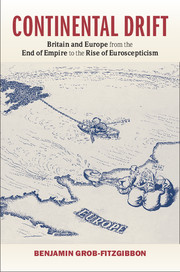Book contents
- Frontmatter
- Dedication
- Contents
- Acknowledgements
- List of abbreviations
- Introduction
- Part 1 Imperial Europeans
- 1 A world undone
- 2 Mr Churchill's Europe
- 3 Mr Bevin's response
- 4 The German problem
- 5 A disunited Europe?
- 6 The continental surprise and the fall of the Labour government
- 7 The realities of government
- 8 Perfidious Gaul
- 9 The decline and fall of the imperial Europeans
- Part 2 Post-imperial Eurosceptics
- Conclusion: Post-imperial Britain and the rise of Euroscepticism
- Notes
- Bibliography
- Index
3 - Mr Bevin's response
from Part 1 - Imperial Europeans
Published online by Cambridge University Press: 05 May 2016
- Frontmatter
- Dedication
- Contents
- Acknowledgements
- List of abbreviations
- Introduction
- Part 1 Imperial Europeans
- 1 A world undone
- 2 Mr Churchill's Europe
- 3 Mr Bevin's response
- 4 The German problem
- 5 A disunited Europe?
- 6 The continental surprise and the fall of the Labour government
- 7 The realities of government
- 8 Perfidious Gaul
- 9 The decline and fall of the imperial Europeans
- Part 2 Post-imperial Eurosceptics
- Conclusion: Post-imperial Britain and the rise of Euroscepticism
- Notes
- Bibliography
- Index
Summary
The Foreign Secretary Ernest Bevin was sceptical of Churchill's calls for a United States of Europe. He was not the only one. Throughout the Foreign Office as a whole, there was deep unease at Churchill's campaign. On 29 January 1947, just weeks after Sandys formed the British United Europe Committee, Gladwyn Jebb (Assistant Under Secretary of State for Foreign Affairs) sent a note to Sir Oliver Harvey (Deputy Under Secretary of State for Foreign Affairs) suggesting that the idea of a United States of Europe was ‘surely a very dangerous thing for us to encourage’. He gave four reasons: first, the original ‘Paneuropa’ idea presented by Coudenhove-Kalergi envisioned a European Parliament elected by proportional representation, which would give the Germans and Italians a combined 35 per cent of the seats, a frightening concept less than two years after the war's end; second, all member-states would be bound by the decisions of the European Parliament, leading to a distinct loss of sovereignty; third, the creation of a United States of Europe would accomplish what Hitler had failed – binding together all European nations into a single bloc – and would have only one result, ‘namely a new war against Russia’; and, finally, the success of such a scheme would put the British people ‘completely at the mercy of the Germans’ – ‘after all, the Count is half German and half Japanese and must therefore be assumed to have the interests of the Axis at heart’. Jebb assumed in his memorandum that ‘the U.K. and U.S.S.R. would be excluded’ from a United States of Europe. When he was informed, ‘No. The advisors of the present movement envisage the inclusion of at any rate the U.K.’, his position against it hardened further.
On 3 February, the Foreign Office distributed a statement of official policy: ‘His Majesty's Government are definitely opposed to this movement for a United States of Europe. … A United States of Europe would be an artificial grouping which would ex hypothesi not include, and thereby would inevitably be regarded as being directed against, Soviet Russia. It would accordingly weaken the United Nations idea which it is the cardinal policy of His Majesty's Government to support, and which itself depends for success upon the fullest co-operation between the Great Powers which grew out of the wartime alliance’. It would, however, support a Western European regional bloc intended to restrain Germany.
- Type
- Chapter
- Information
- Continental DriftBritain and Europe from the End of Empire to the Rise of Euroscepticism, pp. 60 - 78Publisher: Cambridge University PressPrint publication year: 2016



